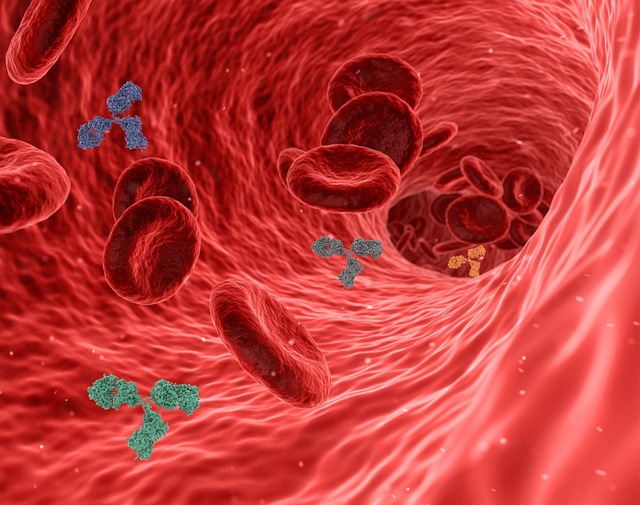The Endocannabinoid System (ECS) is a recently discovered network vital for maintaining homeostasis in mammals, influencing processes like pain, appetite, mood, and memory. Unlocking its complexities offers immense therapeutic potential for conditions like chronic pain, anxiety, inflammation, and metabolic diseases. Ongoing research aims to leverage the ECS's natural healing mechanisms through innovative treatments, with future prospects including personalized medicine. Ethical considerations are paramount as scientists explore the ECS, balancing advancements with animal welfare. Understanding the Endocannabinoid System is key to harnessing its potential for overall health and well-being.
The endocannabinoid system (ECS) is a fundamental physiological network found in all mammals, playing a pivotal role in maintaining homeostasis—the body’s intricate balance. This complex system, with its endocannabinoids and receptors, regulates various processes, from pain perception and appetite to mood and memory. Understanding the ECS is crucial as it offers therapeutic potential for numerous health conditions. This article delves into the basic functions of the ECS, its impact on mammals, health implications, recent research, ethical debates, and the exciting prospects that continue to unfold in the field of endocannabinoid research.
An Overview of the Endocannabinoid System: Unveiling its Basic Functions

The Endocannabinoid System (ECS) is a complex physiological system that plays a pivotal role in maintaining homeostasis, or balance, within the body. It was first discovered in the late 1990s and has since been a subject of intense research due to its profound implications for human health and disease. The ECS is comprised of endocannabinoids, receptors, and enzymes. Endocannabinoids are endogenous compounds that bind to specific receptors located throughout various organs and tissues. These receptors, primarily CB1 and CB2, are involved in regulating numerous physiological processes, including pain sensation, appetite, mood, memory, and immune response.
Understanding the ECS is crucial as it offers insights into how our bodies respond to external stimuli and internal signals. Its basic functions include modulating neurotransmitter release, influencing cell proliferation and survival, and mediating inflammatory responses. The ECS’ ability to interact with these processes suggests its potential therapeutic applications in treating conditions such as chronic pain, multiple sclerosis, anxiety disorders, and metabolic diseases. By unraveling the mysteries of this intricate system, researchers hope to develop innovative treatments that can harness the body’s natural healing mechanisms.
The Role of Endocannabinoids in Homeostasis: A Key Player in Balance

The Endocannabinoid System (ECS) is a complex cellular communication system found in all mammals, playing a crucial role in maintaining homeostasis—the body’s internal balance. This intricate network consists of endocannabinoids (eCBs), receptors, and enzymes that work together to regulate various physiological processes. eCBs are lipid-based molecules produced by the body on demand, signaling through two primary receptors: CB1 and CB2. These receptors are expressed in numerous cells and tissues throughout the body, including the brain, immune system, and peripheral nerves.
One of the key functions of the ECS is to help regulate pain perception, appetite, mood, memory, and inflammation. When the body experiences a disruption in homeostasis, such as during exercise, stress, or injury, the ECS steps in to restore balance. For instance, following physical activity, endocannabinoids are released, promoting feelings of relaxation and reducing muscle pain and inflammation. Understanding the ECS is vital because it offers potential therapeutic avenues for various conditions, highlighting its significance in overall health and well-being.
Understanding the Impact on Mammals: Unique Adaptations and Behaviors

The endocannabinoid system (ECS) is a complex network found in all mammals, playing a pivotal role in maintaining homeostasis—the body’s internal balance. This intricate system influences various physiological processes, including pain perception, appetite, mood, and memory. Understanding the ECS is key to unlocking the unique adaptations and behaviors observed across mammalian species.
By interacting with cannabinoid receptors located throughout the body, the ECS modulates neural communication, immune responses, and endocrine functions. These interactions give rise to a range of effects, from regulating stress response and energy metabolism to facilitating social bonding and cognitive processes. The ability of mammals to adapt their behaviors in response to environmental stimuli is, in part, facilitated by this remarkable system, highlighting its significance for survival and evolution within diverse ecosystems.
Endocannabinoid System and Health: Exploring Its Therapeutic Potential

The endocannabinoid system (ECS) is a complex physiological system found in all mammals, playing a crucial role in maintaining overall health and homeostasis. It was only recently discovered, but scientists are now exploring its immense therapeutic potential. The ECS consists of endocannabinoids, which are endogenous lipids that bind to specific receptors in the body, and the enzymes responsible for their synthesis and degradation. One of the most well-known endocannabinoids is anandamide, known for its role in regulating mood, appetite, and pain perception.
Understanding the ECS offers a promising avenue for developing novel treatments for various conditions, such as chronic pain, anxiety, and inflammation. Its involvement in neuroprotection and immunomodulation has sparked interest in using ECS-based therapies to treat neurodegenerative diseases and autoimmune disorders. The ECS’s ability to interact with multiple physiological processes makes it a fascinating target for researchers, suggesting a future where targeted interventions could tap into this system’s inherent healing capabilities.
Research Insights: Recent Discoveries and Future Prospects

Recent research has shed new light on the intricate workings of the endocannabinoid system (ECS), a complex physiological system found in all mammals. This discovery is revolutionizing our understanding of homeostasis, the body’s internal balance, and its role in various physiological processes. Scientists have uncovered that the ECS plays a pivotal part in regulating pain perception, appetite, mood, memory, and even immune responses.
With ongoing studies, we are witnessing a surge in potential therapeutic applications. For instance, targeting the ECS has shown promise in treating chronic pain, anxiety disorders, and metabolic conditions. As our knowledge expands, future prospects include the development of more precise and personalized medicine. This involves creating targeted treatments that interact specifically with the ECS, offering improved efficacy and reduced side effects. Understanding the nuances of this system will undoubtedly unlock new avenues for medical advancements, providing hope for various health challenges across different mammalian species.
Ethical Considerations and Ongoing Debates: Navigating the Complexities

The exploration of the endocannabinoid system (ECS) in mammals has sparked both excitement and ethical considerations, leading to ongoing debates within the scientific community. As researchers delve deeper into this intricate biological system, they navigate a complex web of potential implications. One primary concern revolves around the potential misuse of ECS-targeting compounds, especially as interest grows in their therapeutic applications beyond traditional medicine.
This growing field raises questions about responsible research conduct and ethical guidelines. The complexity of the ECS, with its multifaceted roles in homeostasis, suggests a delicate balance between harnessing its potential for medical advancements and preserving animal welfare during experimental procedures. Scientists must carefully consider these complexities to ensure that investigations contribute positively to our understanding while respecting ethical boundaries.
